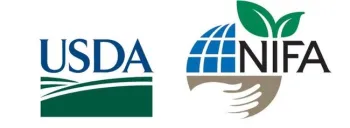Two Vannette Lab Members Receive USDA-NIFA Postdoctoral Fellowships

Crowley-Gall's project, “Examining Pathogen-Induced Changes in Floral Chemistry and Assessing Impacts on Plant-Pollinator Interactions,” will focus on the effects of a plant pathogen on chemical signals that pollinators use when foraging. “Specifically, I will examine changes in nectar chemistry and floral volatile cues as a result of infection and resulting effects on pollinator behavior,” she said. “This proposal will utilize the Erwinia-pear system and the commercially utilized pollinator, honey bees.”
In his project, “The Role of Nectar Trait Plasticity and Nectar-Inhabiting Microbes in Sunflower Pollination,” McMunn will explore the interaction among sunflowers, nectar-inhabiting microbes, and bees in determining sunflower pollination success. “The results of this project will reduce the cost of sunflower production by testing new management strategies involving the introduction of beneficial nectar microbes,” he predicts.
Amber Crowley-Gall
“Globally approximately 16 percent of crops are lost a year due to pathogens,” Crowley-Gall wrote in her project proposal summary. “Plant pathogens can manipulate chemical cues emitted from their hosts to attract potential vectors. Pollinator insects rely heavily on these chemical cues when selecting potential host plants and there is evidence that pollinators can contribute to pathogen spread in agricultural systems. Pollination is widely used in agricultural systems and even crops that are not commercially supplied with pollinators are often exposed to some level of pollination. However, little is known about the effects of pathogens on pollinator behavior or the role of pollinators in pathogen transmission in agricultural systems.
“The purpose of this proposal is to examine the effects of pathogen infection on plant chemical cues and associated effects on pollinator behavior,” she wrote. This proposal will focus on Erwinia amylovora a widely spread pathogen that causes fire blight disease in Rosaceous plants. Effects of Erwinia across plant species will be experimentally tested using in vitro assays to examine effects on nectar chemistry and volatiles as well as pollinator neurophysiological and behavioral responses. Pathogen effects in natural systems will be examined in pear, an agricultural crop valued at $429 million in 2018 in the United States. Changes in nectar chemistry as well as nectar/floral volatiles will be characterized throughout the asymptomatic period of blossom infection. Pollinator behavioral responses and contribution to pathogen transmission will be assessed. This proposal will provide an increased understanding of pathogen affects on pollination in agricultural systems and enhance current pollinator management.”
Crowley-Gall, who joined the Vannette lab in 2019 as a postdoctoral researcher, has published her work in Journal of Hereditary, Ecology and Evolution, and Proceedings of the Royal Society B, among others. She guest-lectured this year in Vannette's chemical ecology course.
A native of Cincinnati, Ohio, Amber holds a bachelor of science degree in biological sciences in 2012 from Wright State University, Dayton, Ohio, where she focused on nematodes for her honor thesis, “Genetic Analysis of Hybrid Male Lethality in Caenorhabditis." The University of Cincinnati awarded her a doctorate in 2019: her dissertation: “Mechanisms Underlying Host Shift in Cactophilic Drosophila. Amber also received the J. Robie Vestal Award for Outstanding Doctoral Student.
Marshall McMunn
“Production of many crop plants remains dependent on insect pollination, which occurs as a result of insect attraction to the nectar and pollen within flowers,” McMunn related. “Recent advances in pollination biology have demonstrated that nectar traits are frequently altered by nectar-inhabiting microbes (bacteria and yeast), leading to changes in bee visitation rates. Despite the central role of nectar traits in crop pollination, there is limited information on nectar traits that have known effects on bee preference.”
“The goal of this project is to explore the interaction among sunflowers, nectar-inhabiting microbes, and bees in determining sunflower pollination success,” he said. This will be accomplished through three objectives:
- characterize sunflower nectar traits and nectar-inhabiting microbes using a comparative field study
- assay bee preference for microbially inoculated nectar in a lab study and
- measure change in sunflower nectar traits and bee visitation following microbial inoculation in an experimental field study. The results of this project will reduce the cost of sunflower production by testing new management strategies involving the introduction of beneficial nectar microbes.
As a National Science Foundation Postdoctoral Research Fellow in Biology (August 2018 to July 2020) at UC Santa Cruz and UC Davis, McMunn is co-advised by faculty members Rachel Vannette of UC Davis, and Stacy Philpott of UC Santa Cruz.
Marshall, a native of Jackson, Mich., received his doctorate in population biology in June 2018 from UC Davis, and his bachelor's degree in ecology and evolutionary biology in 2009 from the University of Michigan, Ann Arbor. A 2018 UC Davis Professors for the Future Fellow, he has published his work in the journals Environmental Entomology, Arthropod-Plant Interactions, Ecological Entomology, and Ecology, among others. He served as a UC Davis teaching assistant for four years, and in 2016, taught at the UC Davis Bio Bootcamp 2.0, a weeklong research summer camp for high school students.
Vannette, a community ecologist, assistant professor and Hellman fellow, now has three graduate students, two postdoctoral scholars (another to start in September) and three undergraduates and a junior specialist working in her lab. (See their projects here.)
